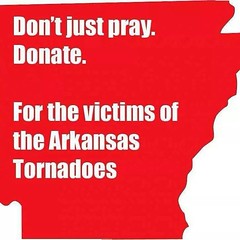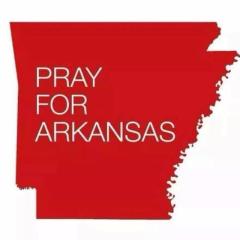 These tornadoes last Sunday in Arkansas (as well as the tornadoes that hit Oklahoma, Missouri and Mississippi) have really had an impact on me. Some things you just feel personally involved in. I was fortunate enough to be 20 miles away from them and don't personally know anyone who was directly impacted by it (though I have many friends of friends who were injured, lost homes and lost loved ones). Some things just call you into action; these tornadoes are one of those things.
These tornadoes last Sunday in Arkansas (as well as the tornadoes that hit Oklahoma, Missouri and Mississippi) have really had an impact on me. Some things you just feel personally involved in. I was fortunate enough to be 20 miles away from them and don't personally know anyone who was directly impacted by it (though I have many friends of friends who were injured, lost homes and lost loved ones). Some things just call you into action; these tornadoes are one of those things.One obvious reason this particular disaster is so important to me is that it literally hits home; the communities destroyed by the storm are communities I grew up around, had friends in. They are right down the road. It could've been us. It was so close. We were in the storm too, we felt the rising panic, we had our closet ready to take shelter in.
But there's something else to it.
I've realized that for the last several - well, all actually - years of my life, I've been very selfish and lazy. I don't mean these things didn't impact me then. They always have, especially those that personally hit home. Some things affected me more than others. That is natural, and I don't blame myself for not springing into action after every evening news bulletin. The problem is - and my regret - is that my go-to 'action' tended to be prayer.
If I couldn't do anything - and often I felt I couldn't - I just prayed. Sometimes I prayed fervently, sometimes I just prayed flippantly (though I didn't mean to be flippant). I prayed for victims of Hurricane Katrina and tsunamis and Sandy Hook Elementary School. These tragedies happened so far away from me that it's true I couldn't really do anything to help. So I just prayed.
What I regret now is that praying is all I did. I didn't try to think any harder for ways to help.
We can argue all day long whether prayer really works (I'd argue it does not). That's not actually the point (though, it is intimately entangled with the point, nevertheless). The point is, I felt praying did something and therefore I had done something and thus I could go back to my regularly scheduled program. Praying took away the guilt and helplessness and let me get on with my life. As my conscience would prickle and remind me of those still suffering, I'd offer up another prayer, as if it did something. It allowed me to move on.
Prayer, as it turns out, is a supremely selfish and lazy 'action'. It makes the one praying feel better and that is it. It does nothing for no one. (I may end up having to argue against prayer if I keep going this route!) It is not an 'action' at all, no matter how much emotion you put into it.
I first discovered this only a few months ago. A high school friend's dad died unexpectedly. She came back into town for the funeral. I hadn't seen her in years, so I didn't really know what to say or do. I realized that my normal response would have been prayer, but by this time, I had already become atheist. I had no idea what to do. I didn't want to believe that atheists really did have no hope to offer (a belief I'd always held before), so what then could an atheist do without those magic words 'I am praying for you'?
They get creative.
They get real.
They take action.
Like I said, I hadn't seen her in years, aside from the quick one-off reunion get-togethers, so it wasn't appropriate to just 'be there' for her. She doesn't have kids that I could've offered to watch for her while she processed her shock and grief. She had lots of family around her to support her. I knew the only thing to do was to put myself in her shoes (as uncomfortable as that was, facing the idea of a parent's mortality) and think of what she might need from a random old friend.
I thought about the mundane things that need to be done, despite a tragedy. Housework, bills, groceries. I thought about how no one really feels like eating at meal times but get hungry sporadically through the day. No one feels like cooking, so someone makes a fast food run. Fast food just makes them feel worse though, which is not what they need right now.
I'm not rich, let me just state that. We don't have a lot of money to spare. But I could spare a small bag of groceries. I ended up picking up some bread, cheese, ham, lettuce, bananas, milk and a box of cookies. I swung by her mom's house to drop them off.
It was seriously awkward.
Her sister who didn't have a clue who I was answered the door. She said her sister wasn't home. I awkwardly, self-consciously handed her the bag of groceries and said something stupid like, 'Just in case you all get hungry.' Then we both stood there uncomfortably for a couple of seconds before I said, 'Bye...' and turned back to my car and drove off. I felt like an idiot.
Getting creative during a tragedy isn't easy. It requires you to imagine yourself in an uncomfortable situation to realize what someone else might need. Getting real requires not always knowing what to say or how to say it and feeling awkward and fidgety and stupid about it. Taking action means sacrificing a little of your own comfort (that little bag of groceries had to come out of my already tight grocery budget for our family, meaning I didn't have as much to spend later that week on us). It's not easy. It's not nearly as easy as praying.
I guess I feel that I have a lot of inaction to make up for. A lot of 'just praying' and doing nothing. We have a responsibility on this earth to express and demonstrate empathy for one another, not just in thought but in deed. I have been inactive long enough. I have been selfish long enough.
I still don't have lots of money to donate to the tornado relief. We still don't have many items around the house to donate, seeing as we moved here less than a year ago with nothing to our name but twelve suitcases, having sold/given away everything we owned in the UK. I have two small children at home, so I can't do much in the way of volunteering. I found out today I can't even give blood because of my years abroad. But this won't stop me anymore. I won't use inconvenience as a reason to do nothing. I won't just sit around, tossing up a quick prayer now and again to ease my guilt and helplessness. I just have to get creative. I'll donate what little household items I can. I'll cut a few things out of our budget (that beautiful necklace I wanted to buy for my friend's birthday will just have to wait). I'll encourage others to donate needed items and give blood in my place. I'll babysit my neighbor's kids to free her up to go volunteer. If I can find a babysitter myself, I'll give some of my time too.
If you believe in prayer, go ahead and pray too. But please don't just leave it at that. We only have a few years on this earth to make a difference. Get off your knees and take on the responsibility of empathy. Adore it.








